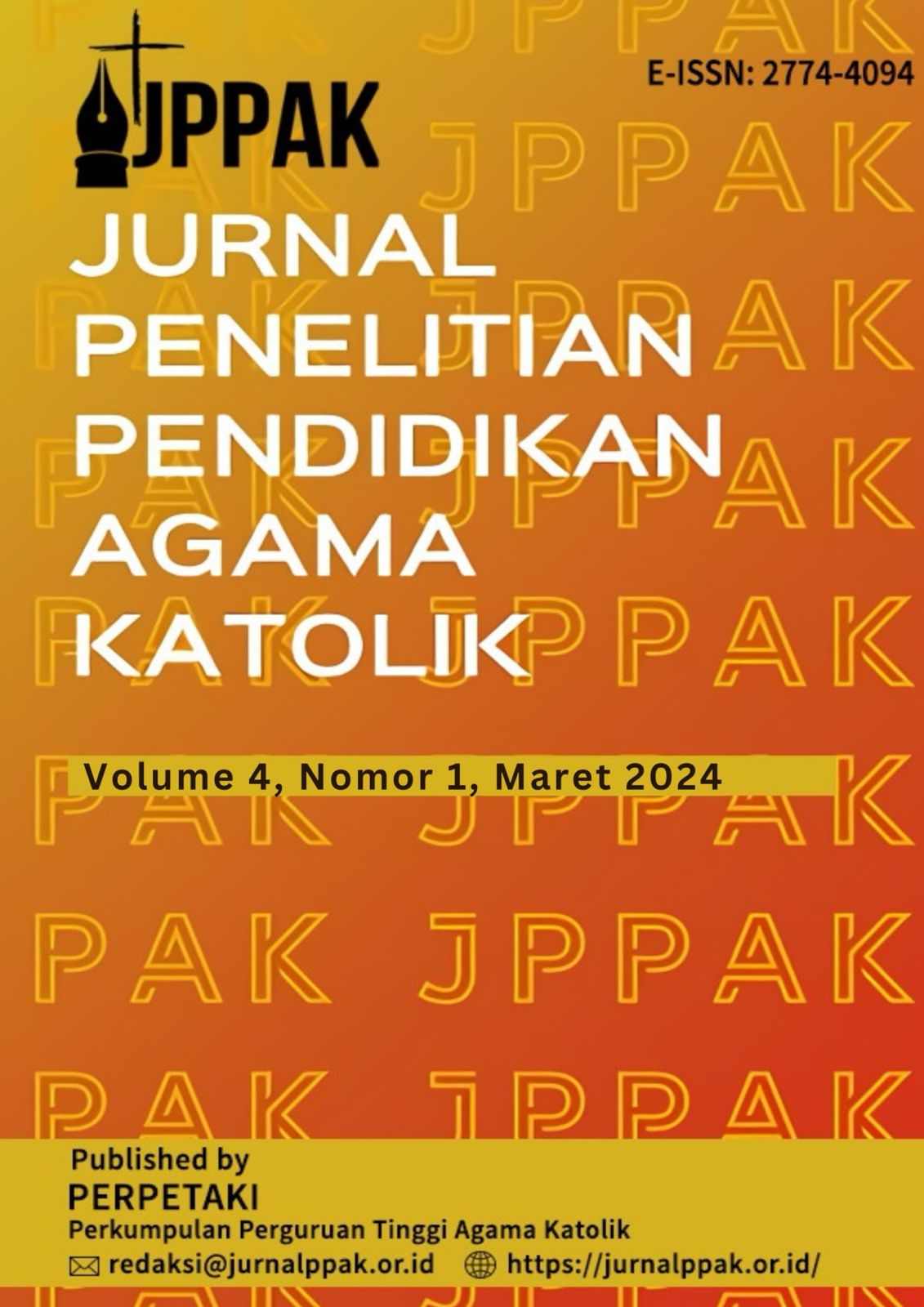Analisis Potensi Lingkungan Familia di Stasi Santo Ignatius Pala Pulau Paroki Hati Santa Perawan Maria Tak Bernoda Putussibau Keuskupan Sintang Sebagai Komunitas Basis Gerejawi (KBG)
DOI:
https://doi.org/10.52110/jppak.v4i1.150Keywords:
The Catholic Church, Ecclesiastical Base Community, NeighborhoodAbstract
As a communion of believers, the Catholic Church uses a variety
of faith-enhancing strategies to uphold the beliefs of its members.
One of those efforts is developing a local ecclesial lifestyle called
Basic Ecclesial Community. The Sintang Diocese employs the
term “Lingkungan” (English: neighborhood) or "Kring" to foster
faith at the local level. The “Lingkungan” and Basic Ecclesial
Community have unique traits or indicators regarding their
comprehension and application. This study aimed to determine
whether the “Lingkungan” may develop into a Basic Ecclesial
Community. The intention was to gain more recognition for the
Basic Ecclesial Community as a fresh approach to spiritual
development, particularly for the people who live in the
Lingkungan Familia, Santo Ignatius Pala Island, Hati Santa
Perawan Maria Tak Bernoda Parish, the Diocese of Sintang. The
research method is descriptive-qualitative. This research uses
observations and interviews as data sources. The subject is ten
credible informants. Utilizing the theories from encyclical
documents and scientific references, this research concludes that
with all its potencies, Lingkungan Familia could flourish more by
developing Basic Ecclesial Communities.
Downloads
##submission.downloads##
Submitted
Accepted
Published
How to Cite
Issue
Section
License
Copyright (c) 2024 Angella Dessy Pebriani, Angga Satya Bhakti, Theresia Yovita Cendana Sari

This work is licensed under a Creative Commons Attribution-ShareAlike 4.0 International License.
Copyright Notice and Permissions
Jurnal Penelitian Pendidikan Agama Katolik offers immediate open access to all its content on the principle to make researches freely available to the public, especially to the scholars, to support greater global exchanges of knowledge. This journal encourages all scholarly authors to allow their research openly available, free access and without time restrictions.
All articles published Open Access will be immediately and permanently free for everyone to read and download. Under the CC BY-SA 4.0 license, authors retain ownership of the copyright for their article, however authors grant others permission to use the content of publications in Jurnal Penelitian Pendidikan Agama Katolik (JPPAK) in whole or in part provided that the original work is properly cited. Users (redistributors) of Jurnal Penelitian Pendidikan Agama Katolik (JPPAK) are required to cite the original source by including at least: the full title of the article, the author's or authors' full name(s), JPPAK as the initial source of publication, year of publication and volume number using a propriate citing method.
Copyright encompasses exclusive rights to reproduce and deliver the article in all form and media, including reprints, photographs, microfilms and any other similar reproductions, as well as translations. The reproduction of any part of this journal, its storage in databases and its transmission by any form or media, such as electronic, electrostatic and mechanical copies, photocopies, recordings, magnetic media is prohibited without consent of Jurnal Penelitian Pendidikan Agama Katolik (JPPAK).
Jurnal Penelitian Pendidikan Agama Katolik (JPPAK) is licensed under a Creative Commons Attribution Share-Alike 4.0 International. (CC BY-SA 4.0)
Authors who publish with Jurnal Penelitian Pendidikan Agama Katolik (JPPAK) agree to the following terms:
- Authors retain copyright and grant the journal right of first publication with the work simultaneously licensed under a Creative Commons Attribution Share-Alike 4.0 International (CC BY-SA 4.0) license that allows others to share the work with an acknowledgement of the work's authorship and initial publication in this journal.
- Authors are able to enter into separate, additional contractual arrangements for the non-exclusive distribution of the journal's published version of the work (e.g., post it to an institutional repository or publish it in a book), with an acknowledgement of its initial publication in this journal.
- Authors are permitted and encouraged to post their work online (e.g., in institutional repositories or on their website) after the publication on JPPAK, as long as it not published on other OJS for it will be treated as plagiarism by plagiarism checker apps. It can lead to productive exchanges, as well as earlier and greater citation of published work (See The Effect of Open Access).












